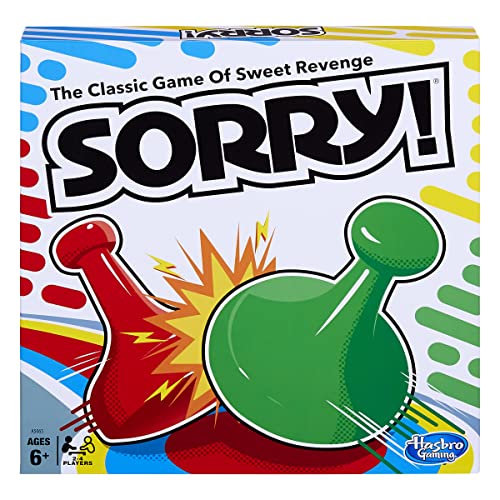Pete's Expert Summary
My human calls this flat, colorful square from a company named Hasbro Gaming a "board game." From my superior vantage point on the arm of the sofa, it appears to be a highly structured and ultimately pointless ritual. They move these little plastic nubs—which they call "pawns"—around a track based on the whims of flimsy paper cards. The entire exercise seems to hinge on a concept they cheerily label "sweet revenge," which involves knocking each other's pieces back to the beginning. While the loud exclamations and tedious turn-taking are an affront to a proper nap schedule, I cannot deny a certain professional appreciation for the core concept. The true value, of course, lies not in the "game," but in the potential of those smooth, skittery pawns, which look perfectly designed for a solo game of "bat-it-under-the-refrigerator."
Key Features
- GAME OF SWEET REVENGE: Enjoy classic Sorry! gameplay with this Sorry! board game for kids. It's an edge-of-your-seat race to home, so hurry up and get there first
- FIRST ONE HOME WINS: Who will be the first player to get all 3 of their pawns to the home space? But watch out! Players can get "sweet revenge" by sending each other's pawns back to the starting point
- SO MANY POSSIBILITIES: Slide, collide, and score to win the Sorry! game. This family game for kids and adults features so many possibilities depending on the card picked up and strategy chosen
- CLASSIC SORRY! GAMEPLAY: Remember playing the original Sorry! game as a kid? Bring back memories of playing the Sorry! game with family members and introduce it to a new generation
- FAMILY GAME NIGHT FAVORITE: A go-to game for family time or anytime indoor fun, the Sorry! game for kids is one of the best family games for game night
- GREAT GIFTS FOR GIRLS AND BOYS: Classic board games make entertaining family gifts for kids ages 6 and up who love group games
A Tale from Pete the Cat
The Unfurling began, as it often does, after dinner. The humans, flush with their strange, cooked food, brought out the box. A scent of old cardboard and plastic promises filled the air. The board was laid upon the floor, a garish map of some meaningless territory. Then came the soldiers: twelve identical totems, four each of red, blue, green, and yellow. They were positioned in their starting corrals, awaiting a command I knew would not come from any logical source, but from a deck of shuffled paper. I watched from my throne atop the bookcase, my gray form a silent, judging shadow. The game, if one could call it that, was a study in futility. A pawn would advance with slow, plodding steps, only to be cruelly cast back to its origin by the drawing of a single, devastating card. The humans would shout "Sorry!" but their eyes glinted with a petty, malicious glee I recognized from moments when they "accidentally" shook the bag of treats but did not offer one. I saw the yellow pawn, inching toward its supposed "home," a symbol of all mortal striving. It navigated slides, dodged collisions, and then, a human drew the fateful card. With a flick of a finger, the yellow soldier was banished. It wasn't sorry. It was annihilation. I let out a low, appreciative rumble. This was a truth I understood. As the evening wore on, a new dynamic emerged. My primary human—the one who controls the Good Wet Food—was losing. Her last red pawn was hopelessly trapped, while the secondary human's blue pawn was poised for victory just a few spaces from home. I observed the shift in the room's emotional climate. Defeat made my primary human sullen and distracted, a state not conducive to spontaneous chin scratches or the doling out of salmon-flavored morsels. The balance of the household was at risk. A decisive, external force was required. I did not pounce. I did not swat. Such actions are for kittens. I descended from the bookcase with the deliberate grace of a drifting cloud. I stretched, extending my front paws in a gesture of magnificent boredom. Then, with a casual, almost accidental swish of my plush tail, I made contact with the blue pawn. It was not a violent strike, but a nudge, a whisper of fate. The little blue piece slid from its precarious perch on the board's edge and disappeared under the hulking form of the television stand. The game was thrown into chaos. My human's mood lifted at the shared misfortune. Balance was restored. The game itself is a foolish human pastime, but as a tool for manipulating the cosmos? Exquisite. It has earned its place.

